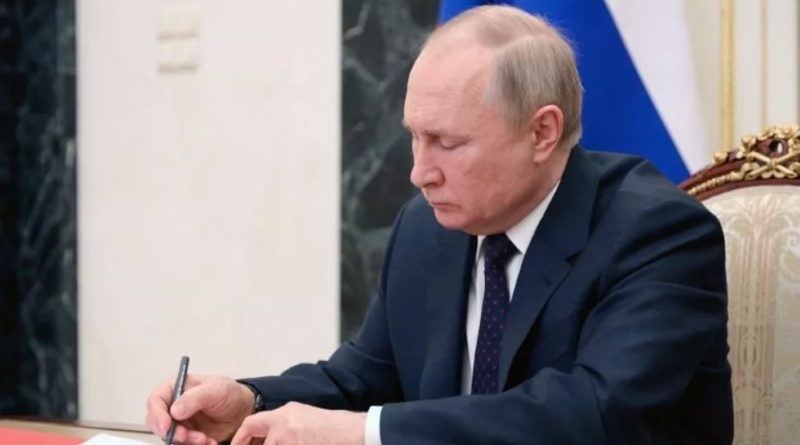To Defeat Putin’s Totalitarianism, Work With Russians
By Ariel Cohen, Alumnus of The Fletcher School at Tufts University.
The White House walked back President Joe Biden‘s recent remarks in Poland calling for Russian strongman Vladimir Putin‘s removal from power. Coming from the American president, the statement was unnecessarily inflammatory amid a strategic environment fraught with dangers of unintended escalation. However, Russian opponents of Putin should be making such calls, and for a good reason.
Putin has long geared up for his war to rebuild the Russian Empire and capture Ukraine. He and his inner circle of KGB veterans decided to do away with the remnants of civic freedoms that post-communist Russia inherited from Mikhail Gorbachev’s perestroika and Boris Yeltsin’s 1990s-era reforms. Post-communist Russia started as a quasi-democracy; it is now reverting toward totalitarianism.
Since coming to power through murky presidential elections, Putin has methodically destroyed the civil society he inherited using a variety of increasingly heavy-handed tactics. These included restricting Duma debates (his handpicked speaker, Boris Gryzlov, famously announced that “the Parliament is not the place for discussions”), targeting free and privately held TV channels, and dissolving independent NGOs like Memorial, which commemorated the victims of communism. Even the wildly funny political muppet show “Kukly” (translation: “Dolls”) was quickly shut down.
Next came political killings and arrests. Anna Politkovskaya, a human rights journalist, was murdered on Putin’s birthday in 2007. In 2011, protesters in Bolotnaya Square were brutally suppressed. Opposition leader Boris Nemtsov was murdered in front of the Kremlin in 2015 by Chechen assassins connected to Chechen strongman Ramzan Kadyrov, a Putin confidant and enforcer. Alexei Navalny was poisoned in 2020, sentenced to prison in 2021 upon his return to Russia and sentenced again last week to serve nine years more.
In addition to targeting political opposition, Putin has also systematically attacked the media, including the forced closure of Echo Moskvy radio and Rain TV. Similarly, the Kremlin has banned Facebook, Twitter, Instagram and LinkedIn. Today, Russia’s Cyber Great Wall is following in the footsteps of its Chinese counterpart, with Muscovites expecting the introduction of political policing similar to the Chinese-style “social credit system” and political reliability rankings.
As Russia’s internal repression and external aggression intensified, Europe, dependent on Moscow’s natural gas, and the U.S., seeking regional partners, preferred to overlook both Russia’s 2008 invasion of Georgia and Moscow’s support for the breakaway Ukrainian Donetsk and Luhansk People’s Republics. In February 2022, the Kremlin recognized the secessionists and invaded Ukraine to “protect” them.
The writing has been on the wall for years—for those willing to read it. Putin’s rhetoric deeming the collapse of the USSR “the greatest geopolitical catastrophe of the 20th century” and his calls to rebuild the old Russian Empire have only gotten shriller since his 2007 Munich speech.
Today, Putin is encouraging the exit of the discontents by proclaiming the need to purge the Motherland of traitors—a chilling return of Stalinist rhetoric. Since the onset of the Ukraine invasion, over 200,000 Russians have emigrated to Europe, as well as Armenia, Kazakhstan, Kyrgyzstan and Uzbekistan. Others are planning to escape before it is too late and life becomes unbearable due to immiseration and general oppression.
The czars and the Bolsheviks until the late 1920s also allowed dissidents to leave, prompting a brain drain, including composer Sergei Rachmaninoff, aircraft designer Igor Sikorsky and many others.
“Canceling” Russian culture and Russians who oppose the war is counterproductive. Previously, the U.S. benefited from German and East European refugees. This time it is no different.
Today, Putin has consolidated his turn to totalitarianism, sending his country back into the mid-1980s, when jail terms and compulsory psych ward treatment were regularly meted out to dissidents, and the food supply was scarce. Russia’s Orwellian future is staring the world in the face.
A poisonous Soviet-like atmosphere of fear and mutual suspicion is settling over the giant country, as thousands of Russians and Belarusians sit in jail for social media posts opposing the war or criticizing the thuggish regime. My Russian friends tell me that people avoid looking each other in the eye or openly discussing anything political.
The U.S. and its allies need to recognize today’s Russia for what Putin has made it: totalitarian and imperialist. If Putin is allowed to reap rewards for his war in Ukraine, it will only whet his appetite. Together with China, Russia will not only challenge the U.S. in Europe, Africa and the Middle East; the two Eurasian giants will ultimately challenge democracy itself.
It is time for pushback, not merely containment. The U.S. and its allies need to take a page from the Cold War playbook, when the West talked to the Soviet citizens over the heads of their Kremlin rulers. Today, a sizable minority of Russians oppose the war. With sanctions biting and genuine Russian voices decrying the war and the regime, the tide in Moscow may turn as it did during the old Soviet fiasco in Afghanistan.
People in Russia and its myriad exiles include thousands of talented writers, broadcasters, filmmakers and social scientists. We need to work with them to expose ordinary Russians to the regime’s crimes.
When the realization of the Ukraine disaster and sanctions effects sink in, Russians can help defeat totalitarianism and create a better future for themselves, Europe and the world.
This piece is republished from Newsweek.

